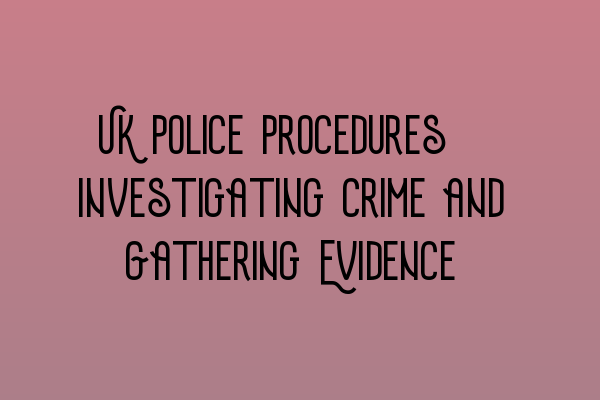UK Police Procedures: Investigating Crime and Gathering Evidence
When a crime is reported, the police play a crucial role in investigating and gathering evidence to support the prosecution. In the UK, there are specific procedures that the police follow to ensure a fair and thorough investigation. Understanding these procedures is essential for both aspiring criminal law practitioners and defendants. This article will provide an overview of key police procedures in the UK.
Initial Steps: Receiving and Recording the Report
The investigation begins when a crime is reported to the police. The initial step involves receiving and recording the report. This is usually done either in person at a police station or through the non-emergency phone line. The report contains essential details about the crime, such as the nature of the offense, the location, and any available evidence.
Once the report is recorded, the police assign a unique reference number to the case. This reference number helps in tracking the progress of the investigation and ensures proper documentation.
Gathering Evidence: Crime Scene Examination
After receiving the report, the police proceed to the crime scene for a thorough examination. The purpose of the crime scene examination is to gather physical evidence that may link the suspect(s) to the crime. This includes collecting fingerprints, DNA samples, photographs, and any other relevant items that could serve as evidence.
The police ensure that the crime scene is secured and preserved, allowing experts to conduct a detailed forensic analysis. This process involves meticulous documentation and the use of specialized techniques to gather and analyze evidence.
For further information on forensic analysis and its importance in criminal investigations, you can refer to our SQE 2 Preparation Courses.
Interviews and Interrogations
During the investigation, the police conduct interviews and interrogations to gather additional information and gather evidence. Interviews are typically conducted with victims, witnesses, and potential suspects. The purpose of these interviews is to obtain statements that can be used as evidence in court.
It is important to note that the police must conduct interviews in accordance with the law and respect the rights of the individuals involved. Understanding the legal framework surrounding interviews and interrogations is crucial for criminal law practitioners. To learn more about this topic, you can explore our SQE 1 Preparation Courses.
Witness Statements and CCTV Footage
Witness statements and Closed-Circuit Television (CCTV) footage are essential pieces of evidence in criminal investigations. Witness statements provide firsthand accounts of the incident from individuals who observed it. The police gather these statements to establish the sequence of events and identify potential suspects.
In addition to witness statements, CCTV footage is often used to corroborate or refute claims made during the investigation. The police thoroughly review available CCTV footage to identify relevant images or videos that may assist in identifying suspects or establishing timelines.
Digital Forensics and Cybercrime Investigations
In the digital age, technological advancements have led to an increase in cybercrimes. The police are equipped with specialists in digital forensics who investigate offenses such as online fraud, hacking, and digital theft. These specialists analyze electronic devices, networks, and online activities to gather evidence needed to prosecute cybercriminals.
For individuals interested in pursuing a career in digital forensics or understanding the complexities of cybercrime investigations, we offer comprehensive SRA SQE Exam Dates to help you prepare.
Evidence Preservation and Chain of Custody
Throughout the investigation, the police must ensure proper evidence preservation and maintain a clear chain of custody. Evidence preservation involves storing and handling physical items in a manner that prevents contamination or tampering. This is crucial to ensure the reliability and admissibility of the evidence in court.
The chain of custody refers to the documentation of the movement of evidence from the crime scene to the courtroom. This documentation includes details of who had possession of the evidence at each stage. Maintaining an unbroken chain of custody is essential to establish the integrity and authenticity of the evidence.
In Conclusion
UK police procedures for investigating crime and gathering evidence are crucial for a fair and effective criminal justice system. By following specific protocols, the police ensure that evidence is collected and handled in a manner that preserves its integrity. Understanding these procedures is essential for aspiring criminal law practitioners and anyone involved in the criminal justice system.
For further practice and preparation, we recommend exploring our SQE 1 Practice Exam Questions and SQE 1 Practice Mocks FLK1 FLK2, which provide invaluable resources to enhance your knowledge and skills in criminal law.
